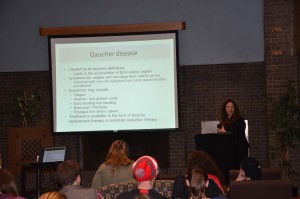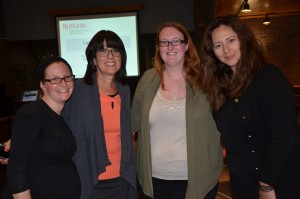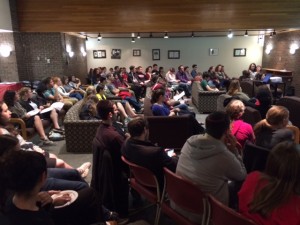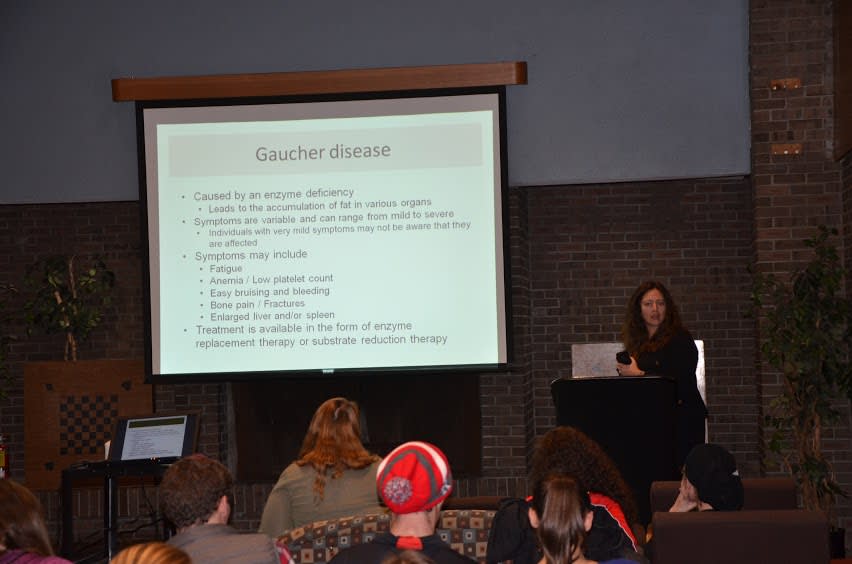
On October 14, the OU Jewish Learning Initiative on Campus at Rutgers and Rutgers Hillel held a “Jewish Genetic Awareness and Screening Event.” A packed crowd of over 80 students learned about Jewish genetic diseases, the role of genetic screening and the Jewish perspective on testing and intervention.
Sara Frieberg, Co-Director of OU-JLIC at Rutgers, welcomed the students and introduced Elena Ashkinadze and Molly Ciarlariello, genetic counselors in the Department of Genetics at the Rutgers-Robert Wood Johnson University Hospital (RWJUH). The genetic counselors presented an overview of genetics and highlighted some genetic diseases common in the general population and those with a higher preponderance in the Jewish community. They discussed the importance of knowing one’s carrier status prior to marriage and conception – knowledge that empowers a couple to make educated decisions, should they confront the possibility of an affected child.
Rabbi Shaul Rappeport of the Puah Institute, an organization dedicated to providing support for Jewish couples with fertility and genetic challenges, spoke on the Jewish-ethical aspects of genetic screening. Rabbi Rappeport presented several examples of Talmudic discussions regarding family histories of disease, thus illustrating an early understanding of genetics and heredity within Judaism. Students were able to ask questions to the rabbi and genetic counselors in both an open forum and on a one-on-one basis.
“I think this seminar was essential for young Jewish students like myself who would like to start a family someday,” said Rutgers student Elijah Reiss. “It is an imperative to be informed early on about genetic diseases so you can make choices later in life regarding having children in a well thought out manner.”
This event culminated a two-year effort by Edison-community member Zelda Wildman.

“My interest in Jewish genetic diseases dates back to my undergraduate days,” said Mrs. Wildman. “As a graduate student and National Institute of Health (NIH) fellow I had the opportunity to study one specific Jewish genetic disease, and ironically, I discovered that a close friend had recently been diagnosed with the disease. From that time, I set a goal of helping young Jews become genetically aware before having children, and to make screening a realistic option. In today’s world of technology, much can be done to ensure good reproductive outcomes.”
Ms. Wildman was once a Rutgers graduate student in genetics and completed a fellowship at NIH studying the Jewish genetic disease, torsion dystonia. Her goal was to provide Jewish students at Rutgers with accurate and current information on Jewish genetic disorders and to provide an opportunity for them to be screened. Ms. Wildman and Ms. Frieberg joined forces last year and worked with the RWJUH Department of Genetics for many months to make Wednesday’s event happen. They were successful in obtaining a grant from Pfizer Pharmaceuticals to help finance the event, as well as recruiting a committee of public health and pre-med students to help with publicity and logistics.

The program was unique in utilizing the local clinical resources of RWJUH in partnership with Rutgers Hillel. Joining community and campus together provides students with expert medical services and a seamless opportunity to get screened and then counseled. Ms. Wildman hopes this program will serve as a model for other university campuses across the country. Other campuses that have OU-JLIC and Hillel can partner with local medical schools’ genetics departments to provide Jewish students with the opportunity to learn more about the importance of genetics screening.
Follow-up screening using saliva samples will be completed on October 29 at Rutgers Hillel, through the Department of Genetics at RWJUH. Students who are not insured will be provided with financial support. Anyone wishing to participate in the screening or would like more information about the program, should contact Sara Frieberg at: sara@rutgershillel.org.
The words of this author reflect his/her own opinions and do not necessarily represent the official position of the Orthodox Union.

